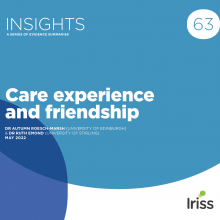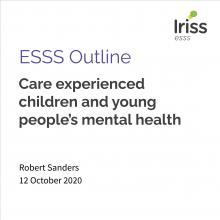Summary of research
Separation and loss characterise a child’s experience in care, yet, losses in the care-experienced population have rarely been studied as a possible source of trauma, or as events that may justify a grief response. This review seeks to understand the experience and needs of children in care through the lens of ambiguous loss and disenfranchised grief, to determine what value these concepts can bring to the field.
The theories of ambiguous loss and disenfranchised grief may facilitate a more comprehensive understanding of adverse influences on the lives of this vulnerable community.
Ambiguous loss can be typified by the loss experienced by family members of people with a progressive or permanent cognitive condition such as dementia, or where a person is physically absent but remains psychologically present because there has been no death or permanent loss.
Disenfranchised grief can occur when a relationship is not acknowledged or non-traditional and thought not to be close enough. Examples could include a non-heterosexual or extramarital relationship.
A literature search relating to ambiguous loss and disenfranchised grief in the children in care population was carried out. A total of 592 publications were retrieved, 41 full text articles were reviewed and 16 publications were included.
Findings
Thematic analysis of the included publications revealed four top-level themes:
Type of ambiguous loss – there are many different aspects and types of ambiguous loss that can be stratified into two broad types: relationship losses and psychosocial losses.
Manifestations of ambiguous loss – behaviours labelled as ‘problem’ behaviours, such as anger, aggression, hostility and withdrawal, that have thus far been viewed as behavioural and emotional problems of children in the care system, may in fact be indicators of the manifestations of ambiguous loss and disenfranchised grief.
Transitions – manifold and continuous ambiguous losses associated with multiple placement moves has a cumulative effect that can generate long-term negative consequences, such as limited emotional connections and an inadequate sense of belonging into adulthood;
Counteracting the effects of ambiguous loss – encouraging children in care to make meaning of their situations and supporting them to recognise that their losses may not be resolvable. They are supported to build tolerance and resilience to the inherent ambiguity and helped to rebuild their identity and permanent connections to counteract the effects of ambiguous loss.
Discussion and conclusion
Short-term behavioural manifestations and long-term effects of ambiguous loss and disenfranchised grief in care-experienced individuals may have damaging consequences. Social workers have a key role to play in acknowledging ambiguous loss and enfranchising the grief of children and young people in care.
Completed: May 2021.
About the author
Jude Leitch completed this review as part of the Masters' of Social Work at the University of Edinburgh. Her interest in the topic was sparked on learning about disenfranchised grief, which she broadened and strengthened during her first professional placement working with care-experienced young people. Jude now works in the fostering and adoption field of social work and hopes to make a positive impact in professional practice.
Copyright © 2021 Jude Leitch. All rights reserved. The author has given permission for this work to be downloaded and shared in the attached format for educational purposes only. For other permissions, please contact the author.
Contact: jude.m.leitch@gmail.com




